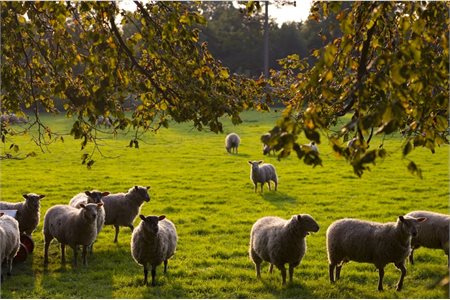
November 3, 2021, by Lexi Earl
Meeting the protein needs of a growing, and aging, global population with healthy and sustainable protein sources
We need sources of protein that don’t harm human or planetary health, writes Prof Andy Salter.
Humans require sufficient supplies of dietary protein, of appropriate quality, to grow and maintain health throughout their lifespan. Protein quality is dependent on both the amount of essential amino acids contained and its digestibility. While animal-derived foods represent rich sources of high-quality protein, there is increasing concern about their impact on both human health and the environment. High consumption of red and processed meat is associated with a range of chronic diseases including heart disease, type 2 diabetes and colon cancer. Animal agriculture is often viewed as an unsustainable use of natural resources and it has been estimated that of all the crops grown, approximately half of the associated protein is fed to farm animals. Farm animals also make a significant contribution to pollution, of both land and waterways, and are responsible for production of a significant volume of greenhouse gases (particularly methane from ruminants). The Future Protein Platform is part of the University of Nottingham’s Future Food Beacon and is focused on identifying alternative protein sources that can be consumed by people and/or used as animal feed components, that are both healthy for the population and the planet.

Legumes and pulses are possible protein sources
Our work focuses on three potential sources of such proteins: underutilized crops, insects, and single cell organisms. Underutilized crops include a range of plant species that may have been traditionally consumed by human populations for many generations but have not been commercially exploited. This is often because the presence of chemicals, called anti-nutritional factors, make the protein (and often micronutrients) difficult to digest and absorb, by either humans or farm animals. Two examples we are actively studying are Bambara groundnut, which is indigenous to sub-Saharan Africa and Winged bean, which is often grown in hot and humid countries such as Sri Lanka. We are currently exploring how digestibility might be improved through both selective breeding and novel processing techniques. We will be featuring more on Bambara groundnut and Winged bean in the coming weeks.

Rows of winged beans growing in the field. Winged bean are possible future sources of protein.
Insects are a traditional part of the diet of many global communities with an estimated 2 billion people consuming them regularly. Insects also represent the natural food of many animal species. They are a rich source of high-quality protein, have low land and water requirements, a low carbon footprint and can often be fed on substrates of poor nutritional value. We have been working with commercial suppliers to develop economically and environmentally viable and safe systems for the large-scale production of insects both as food and animal feed. For example, we have recently shown that mealworms can replace a significant proportion of soy bean protein in the feed of broiler chickens without impacting on growth. Having recently produced a draft of the mealworm genome we are currently identifying key genes that can be targeted to improve growth and nutritional value of the larvae.
The final source we are exploring are single-cell sources such as algae, fungi and bacteria. Of course, fungi, such as mushrooms, have long been part of the human diet, and yeast and bacteria have been used in fermented foods to improve nutritional value and food longevity. More recently, the filamentous fungus, fusarium venenatum, has been used as the major protein source in the range of meat analogues produced by Quorn, which has become increasingly popular in many countries around the word. Micro and macro- algae also show promise as protein-rich foods and feed and there is increasing interest in the production of bacterial species as protein-rich ingredients. Bacteria have high protein content, are a good source of essential amino acids and have a low environmental footprint. There is growing evidence that bacterial protein can replace conventional ingredients in animal and fish feed, and we are working with the emerging industry to address the requirements to make such industry economically viable and safe.
We believe the University of Nottingham is now at the forefront of research looking at novel sources of protein, combining the expertise of plant, animal and food scientists with nutritionists, with investment in state-of-the-art technology for production, formulation and nutritional assessment of novel food and feed ingredients. Our work has the potential to reduce the impact of food production on the environment, while meeting the needs of a growing, and aging global population. However, from a UK perspective, this will be dependent on a committed and flexible policy approach toward including these ingredients, one proven safe, into our food systems. Such flexibility would potentially place the UK agricultural and food industries in a strong position to reduce the impact of food production on the environment while maintaining a competitive and robust position in world markets.
Andy Salter is a professor of nutritional biochemistry in the School of Biosciences, and leads the Future Food Beacon’s Future Proteins Platform.
Further reading:
Salter AM and Lopez-Viso C (2021) Role of novel protein sources in sustainably meeting future global requirements. Proc Nutr Soc https://doi.org/10.1017/S0029665121000513
Szepe KJ, Dyer PS, Johnson RI, Salter AM and Avery SV (2021) Influence of environmental and genetic factors on food protein quality: current knowledge and future directions. Current Opinion in Food Sci 40, 94-101 https://doi.org/10.1016/j.cofs.2021.02.005
Hawkey KJ, Lopez-Viso C, Brameld JM, Parr T and Salter AM (2021) Insects: A Potential Source of Protein and Other Nutrients for Feed and Food. Ann Rev Animal Bioscience 9: 333-354. https://doi.org/10.1146/annurev-animal-021419-083930
Salter A (2020) New sources of sustainable protein for a heathier future. Science in Parliament, Vol 76 No 4, Winter 2020. https://www.scienceinparliament.org.uk/publications/science-in-parliament-member/
Follow Andy on Twitter: @andymsalter
No comments yet, fill out a comment to be the first

Leave a Reply